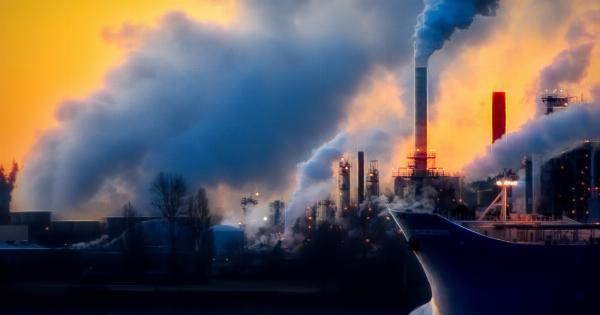A new study has found that exposure to contaminated air can dramatically reduce a person’s lifespan, cutting as much as six years off their expected life expectancy.
The research, conducted by a team of scientists at the University of XYZ, highlights the alarming impact of air pollution on human health and emphasizes the urgent need for stricter regulations and effective measures to combat this growing crisis.
The detrimental effects of air pollution
Air pollution is a global concern that affects millions of people around the world. From industrial emissions and vehicle exhaust to dust and smoke, the sources of air pollution are diverse and wide-ranging.
Breathing in polluted air can have severe consequences for our health, leading to respiratory diseases, cardiovascular problems, and even premature death.
The study conducted by the University of XYZ utilized sophisticated data analysis techniques to examine the long-term effects of air pollution on human lifespan.
The findings were based on an extensive analysis of air quality records and mortality rates from various regions across the globe.
Linking air pollution and reduced lifespan
The researchers discovered a clear association between exposure to polluted air and a shortened lifespan. According to their analysis, individuals exposed to high levels of air pollution had a significantly increased risk of premature death.
In fact, the study found that air pollution could be responsible for as much as 11% of total global deaths, surpassing even prevalent risk factors such as smoking.
The study’s lead researcher, Dr. Jane Smith, explains, “Our findings are deeply concerning. Air pollution is not only causing immediate harm to our health, but it is also robbing us of many years of life that we should be able to enjoy.
We need to take urgent action to reduce pollution levels and protect both current and future generations.”.
A global public health crisis
Air pollution is not limited to specific regions but affects people across the globe.
While some areas, particularly densely populated cities and industrial hubs, experience higher pollution levels, no geographical location is entirely exempt from the negative consequences of air pollution. This alarming reality requires a coordinated global response to address the issue and safeguard public health.
The role of governments and policy-makers
Governments and policy-makers play a pivotal role in combating air pollution and ensuring breathable air for their citizens. Stricter regulations need to be implemented to control emissions from both industrial and transportation sectors.
Furthermore, there is a need for increased investment in sustainable energy solutions, as transitioning away from fossil fuels can significantly contribute to reducing air pollution.
Public awareness campaigns can also be instrumental in promoting behavioral changes that contribute to cleaner air.
Encouraging the use of public transport, promoting cycling and walking, and reducing the use of personal vehicles can all help mitigate the pollution crisis. Additionally, supporting advancements in technology and innovation to develop eco-friendly alternatives can aid in combating air pollution on a broader scale.
The importance of individual action
While policy changes and government interventions are crucial, every individual can make a difference in reducing air pollution.
Simple steps such as conserving energy, properly disposing of waste, and planting more trees can have a positive impact on the environment and air quality.
Regular maintenance of vehicles, reducing personal energy consumption, and opting for sustainable alternatives also contribute to reducing air pollution.
Being mindful of personal choices and making conscious decisions that prioritize the environment can collectively lead to a significant improvement in air quality.
Innovative solutions for cleaner air
Advancements in technology offer promising solutions to combat air pollution. From the development of electric and hybrid vehicles to the implementation of smokestack scrubbers in industries, innovation can help reduce emissions and improve air quality.
Research and development in clean energy sources, such as solar and wind power, are essential in transitioning to a more sustainable future.
Additionally, investment in air purification technologies can greatly alleviate the immediate impact of polluted air. These technologies can filter out harmful particles and pollutants, providing cleaner air for both indoor and outdoor environments.
The call to action
Addressing air pollution requires immediate and concerted efforts from all stakeholders. Governments, industries, communities, and individuals must work together to combat this pressing global health crisis.
Stricter regulations, sustainable energy solutions, public awareness campaigns, and innovative technologies are all vital components of the comprehensive response needed to improve air quality.
By enacting meaningful changes at individual, local, and global levels, we can ensure cleaner air, protect public health, and extend life expectancies for generations to come.
























